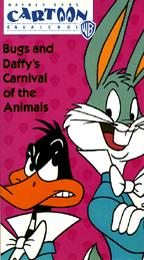| Bugs and Daffy's Carnival of the Animals | |
|---|---|
 VHS cover | |
| Written by | Chuck Jones Ogden Nash |
| Directed by | Chuck Jones |
| Starring | Mel Blanc Michael Tilson Thomas |
| Music by | Camille Saint-Saëns |
| Country of origin | United States |
| Production | |
| Producer | Chuck Jones |
| Running time | 23 minutes |
| Production company | Chuck Jones Enterprises |
| Original release | |
| Network | CBS |
| Release | November 22, 1976 |
Bugs and Daffy's Carnival of the Animals (originally aired on TV as Carnival of the Animals) is a 1976 live action/animated television special featuring the Looney Tunes characters Bugs Bunny and Daffy Duck and directed by Chuck Jones. [1]
Contents
The special, based on Camille Saint-Saëns' musical suite The Carnival of the Animals and consisting of entirely new animation, was purposely cast in the successful mold of Jones' own earlier musical cartoons (including Rabbit of Seville , Long-Haired Hare and Baton Bunny ), and set the familiar showbiz rivalry between Bugs and Daffy against the orchestral backdrop of conductor Michael Tilson Thomas, in a performance based on Saint-Saëns' music and Ogden Nash's poetry. [2]
Carnival of the Animals originally aired on CBS on November 22, 1976, [3] and was the first Warner Bros.-commissioned work featuring Bugs Bunny following the release of the cartoon False Hare , as well as their first Looney Tunes production following the second closure of their original animation studio on October 10, 1969.
This is an abridged version of the work, omitting the "Tortoise", "Characters with Long Ears", "Cuckoo" and "Swan" movements and using the "Pianists" music over the ending credits, they used a part of "Characters with Long Ears when they were reciting the movement "Wild Jackass"